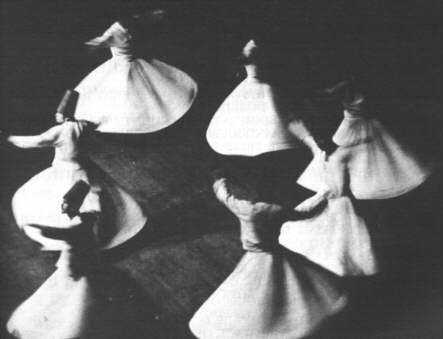Introduction to Sufism and Rumi

Basic Ideas in Sufism

- Suf: literally "white wool, " which stands for the robe sufs wears in renunciation of the world. Sufis are Islamic mystics (not unlike Christian or Buddhist monks) who dedicate themselves to a spiritual awareness of God.
- The Day of Alast: When God created all souls before the world as sparks of himself. All Muslims are to seek to be reunited to God through renunciation and meditation. This doctrine has strong Greek, neo-Platonic elements.
- Nafs: the lower soul, the battleground between the good and the bad angel of one’s soul. One has to lose the self to find God, and if one is successful, the relationship may be so close as to lose distinctiveness: al-Halaj, a famous early sufi, said, "Praise be to me!"
- Each sufi takes a spiritual master and becomes part of a mystical brotherhood that meets regularly for contemplation, instruction, and meditation. Some orders practice mystical dance while chanting the 99 names of God.

Important Stresses in Rumi’s Thought
- Spiritual love bewilders the intellect.
- True love and beauty are in God; all other loves are but derivatives.
- The spiritual friend is the one who is a special receptacle pointing to God’s love.
- The spiritual journey is like falling in love -- with its gains and loses, joys and suffering.
- The center of spiritual discipline is the attempt to escape the ego into God’s oneness.
- All the opposites of the world, even apparent good and evil, are non-existent in God, for all God’s attributes, those of his mercy and those of his justice, are one in God.
- The perfect man is one who has attained to complete spiritual awareness.
Chickpea to Cook (translated by Coleman Barks)
A chickpea leaps almost over the rim of the pot where it’s being boiled.
‘Why are you doing this to me?’
The cook knocks him down with the ladle.
‘Don’t you try to jump out. You think I’m torturing you. I’m giving you flavor, so you can mix with spices and rice and be the lovely vitality of a human being. Remember when you drank rain in the garden. That was for this.’
Grace first. Sexual pleasure, then a boiling new life begins, and the Friend has something good to eat.
Eventually the chickpea will say to the cook,
‘Boil me some more. Hit me with the skimming spoon. I can’t do this by myself. I’m like an elephant that dreams of gardens back in Hindustan and doesn’t pay attention to his driver. You’re my cook, my driver, my way into existence. I love your cooking.’
The cook says, ‘I was once like you, fresh from the ground. Then I boiled in time, and boiled in the body, two fierce boilings.
My animal soul grew powerful. I controlled it with practices, and boiled some more, and boiled once beyond that, and became your teacher.
Chittick’s Translation of the Chickpea passage:
Look at the chickpeas in the pot, how they keep on jumping up, driven by the fire.
At every instant the chickpeas boil up to the top and let out a hundred cries:
"Why are you tormenting us with fire? Since you showed your appreciation for us by buying us, why do you treat us with contempt?"
The housewife keeps stirring with the ladle: "Now, now! Boil sweetly and do not jump back from the one that made the fire.
I do not cook you because I dislike you: I want to gain taste and savor.
You will become food and then mix with the spirit. You do not suffer tribulation because you are despicable.
Fresh and succulent, you used to drink water in the garden; your water-drinking was for the sake of this fire,"
His Mercy is prior to His Wrath, so that Mercy could acquire a stock-in-trade: existence.
For without pleasure, flesh and skin do not grow. If they do not grow, what can love for the Friend waste away?
Gentleness will come again, asking forgiveness: "Now you have purified yourself and jumped across the stream to safety."
She says, "Oh chickpeas! You fed in the spring pasture, and now suffering has come as your guest. Receive it well.
So that the guest may return in gratitude and tell of your generosity before the King.
Then in place of benefits, the Benefactor will come; all benefits will envy you.
I am Abraham, you are my son. Place your head before the knife: I saw in a dream that I must sacrifice you,
Discussion Questions
- What makes Chittick’s translation different in style from Barks’?
- What is the effect of Barks leaving out the portions that Chittck has included? Is the meaning altered in any substantial way?
- Which one do you consider better? Explain.
